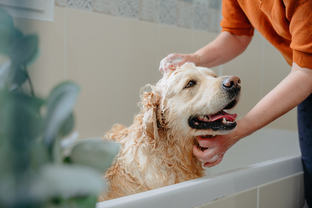
The right habits for looking after your cat's well-being
Taking care of your cat's hygiene is essential. As everybody knows, “cats are clean animals” and spend a lot of time grooming themselves with their rough tongues - when they're not sleeping! But you can make life easier for your cat by paying attention to certain aspects of their well-being. And depending on the breed, special care may prove useful.
A cat's coat can be made up of several types of hair:
- guard hair (or outercoat): long, thick and straight, more abundant on the upper parts of the body.
- awn hair (or secondary hair): slightly wavy and finer.
- down hair (or undercoat): short, soft and very fine, it acts as a thermal insulator.
Depending on the breed, your cat's skin and coat may need extra attention. However, regular brushing is recommended for all cats. Brushing your pet’s coat will help reduce fur shedding, as this tangle of hair is created by a mix of guard hair and awn hair. You should adapt the brushing frequency according to the type and texture of your cat's coat. The longer the hair and the denser the coat, the more often you should groom your cat: once a day for long-haired, wooly cats such as Persians, Sacred Birmans, Maine Coons, Ragdolls, etc., to reduce shedding. Brush at least once a week, no matter the breed.
More frequent brushing is recommended during moulting in spring and autumn, to remove dead hairs. It's worth noting that older cats may have thicker saliva, which tends to clump hair together. As your pet gets older, they will need to be brushed more regularly.
Brushing also allows you to search for any parasites. Remember to check your pet's coat while grooming to detect any fleas, ticks or mites that could cause discomfort.
Finally, regular brushing will prevent your pet from swallowing large quantities of hair that could cause digestive upsets.
Contrary to popular belief, it’s also possible to shampoo your cat: there are specific products available, such as Allerderm™ shampoo sensitive skin, or ask your vet for advice today!
If you find it hard to shampoo your cat, Allerderm™ Foam is a rinse-free micellar water solution. Suitable for dogs and cats. Allerderm™ Foam Cleanser removes dirt fast, without the need for rinsing.
For hairless cats, such as the Sphynx or Devon Rex, there's no need to invest in a brush! But these breeds have very fragile skin that requires special care. Make sure you wash them regularly with a damp glove. And above all, make sure you don't leave them out in the sun.
As a general rule, a cat’s eyes and nose do not require any special care, except in the case of brachycephalic cats, who have shorter skulls and a squashed nose. This is particularly true forPersians, British Shorthairs and Exotic Shorthairs. Special care is needed for this type of cat: we recommend regularly cleaning the folds to avoid infections - particularly the folds at the corner of the eyes and around the nose. Your vet will be able to advise you and explain the right steps to take for this specific grooming routine.
Cats have erect ears. The highly mobile flap of a cat's ear is like a radar that picks up every sound! However, the ear canal can can infected (rarely) or harbour parasitic mites that cause "otoacariasis", commonly known as ear mange. This condition is characterised by head shaking, scratching with the hind legs and blackish deposits in the ear. So be on the lookout for black deposits and constant scratching: these are signs that should prompt you to consult your vet. Also look out for foreign objects, such as grass seeds.
From time to time, check that your cat's ears are clean and free from redness, especially if your cat starts scratching them repeatedly or shaking their head in an unusual way.
A special care should be given to white cats or cats with white patches since the non-pigmented areas such as ears, eyelids and nose can be sensitive to the sun. Exposure to sun can lead to derm problems in these areas that may become serious and even lead to malignant tumor. You may need to keep your cat indoor during sunny days. Sunscreen can be applied on these areas but the cat may leak it and some of these products can be toxic to cats. Check with your veterinarian which one can be used or how to proceed to protect your cat.
Taking care of your cat's paws is important, especially if you have a house cat. A scratching post is essential so they can scratch their nails without attacking your favourite sofa or armchair! It's also a good idea to regularly and gently clip your cat's claws. However, be careful not to cut them too short to avoid any risk of bleeding. If your cat does start bleeding, apply firm pressure to the claw until the bleeding stops, or apply a small bandage.
There’s no need to get cat nail clippers if your pet lives partly outdoors! They need claws to climb trees and they will wear down naturally.
Remember to regularly inspect your cat's claws, paw pads, the underside of the paws and the spaces between the paws that could be harbouring parasites, tick larvae or grass spikelets, to make sure that the paws are healthy, that nothing is stuck and that no wounds have formed.
If your cat likes to wander around town or on the beach, you may have already experienced this: cats can't get rid of chewing gum, tar or any other sticky substances that cling to the hair between their paw pads on their own. To quickly rid your cat of the discomfort caused by these substances, this specific type of cleaning requires professional help: don't let them try to do it themselves, as they could end up hurting themselves in the process.

